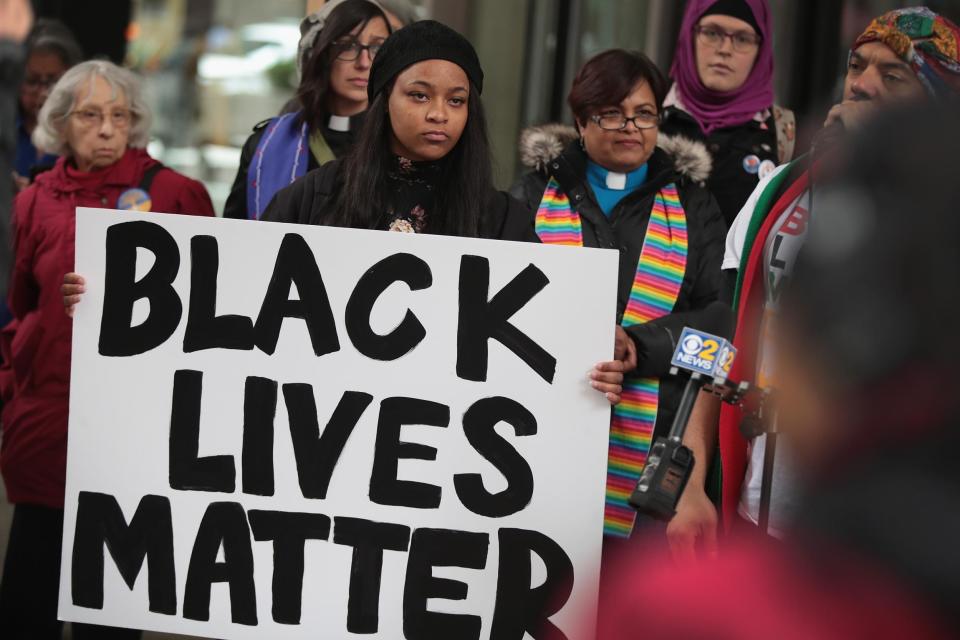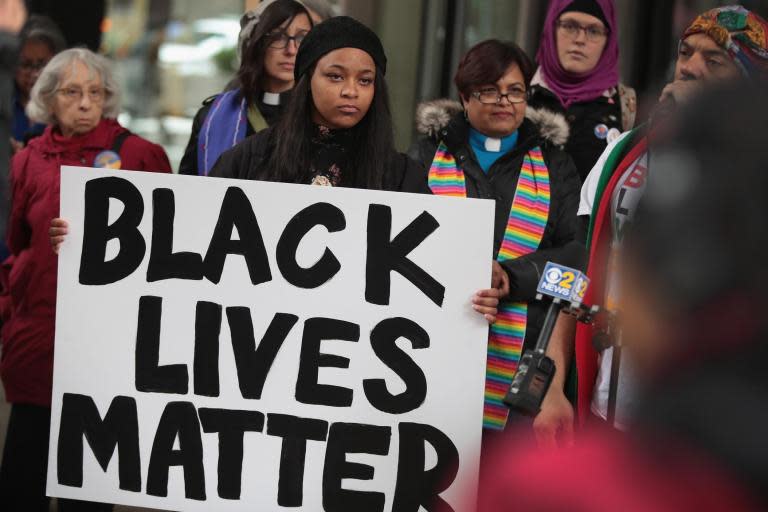Martin Luther King anniversary: 'Echoes of the civil rights leader’s dream seen in Black Lives Matter'
Fifty years after the assassination of Rev Martin Luther King Jr, activists say that the lessons preached by the late civil rights leader still inform the methods of the dominant movements of today, including some of the foundational principles of Black Lives Matter.
King – who has been immortalised as something akin to America’s Nelson Mandela, a man who led the United States away from the damning history of Jim Crow-era segregation and towards an envisioned future of equality – has had a lasting impact on the ways in which modern organisers approach their job, activists say, and the successes of his famous dream are clearly seen even in 2018 America, where racial tensions have once again laid bare following the election of President Donald Trump.
“I think that in a lot of ways things that he envisioned as part of his dream, we have achieved,” said Hawk Newsome, the president of the Black Lives Matter New York chapter, noting progress on segregation, voting rights and the election of America’s first black president in 2008. “But, now it’s time to get to that promised land.”
Observers have noted that Black Lives Matter is perhaps more militant than King was willing to be, but that the civil rights leader still is incredibly important to the movement and its historical thread lines. The realities that shaped modern-day activists – the war on drugs that started in the 1980s and has resulted in decades black men and women being targets of police brutality, for instance – simply mean that Black Lives Matter must be aware of the fact that some level of physicality could become necessary.
“We come from all of that legacy. I think when you take into consideration, too, the context that many of us grew up as children being raised in the 1970s and 1980s, in the height of the war on drugs, in a police state, our posture for organising is actually almost a reflection of the world in which we live,” said Mary Hooks, an organiser in the Atlanta area.
Before his death in 1968, King led a vocal and uplifting effort to desegregate the United States, and to establish equality between the races. He was a strict proponent of non-violent means to achieve those goals, and regularly extolled the virtue and power of love to change the world.
King’s absolute legacy has been disputed recently – it has been said that he had become somewhat disillusioned by the movement he was leading, given the violence against black people that still occurred regularly in front of him – and some of those detractors note that he had been much more radical than the general portrait of the man as an individual willing to work within the system at all costs, staging non-violent protests as a way of pushing existing systems of governance to bend to his will.
In his Letter from a Birmingham Jail, King provided evidence of that more radical side.
He wrote then that he had nearly reached the “regrettable conclusion” that the real obstacle facing his movement to achieve equality was not the forces of white supremacist groups – such as the Ku Klux Klan – but rather a “white moderate” who would say that they agree with the ultimate goal, but resisted the methods of King and others as disruptive.
That concept has been echoed by some of those leading the Black Lives Matter movement, which is known for its large demonstrations that fill streets in cities around the country as protesters force their message to be heard.
“I think that what we’re seeing right now is a crisis of our democracy, and the reality is that these types of actions that we’re seeing – the disruptions, the courageous acts of non-violent civil disobedience – are an effort to call attention to a very real crisis that’s happening in our communities,” Opal Tometi, a founder of the movement, said during a 2015 forum in Washington.
Mr Newsome said that there is at least one other way that King’s legacy has impacted Black Lives Matter, and that it is often overlooked.
He says Black Lives Matter, which prides itself on breaking ground with its intersectional approach for pushing equality, is taking a page out of King’s book by inviting people to lead the charge from all walks of life and demographic groups – regardless of gender or sexuality, and including allies from all races and religions – so that their voices can be heard and given power. King himself was not shy of broader coalitions.
“I think that is something that goes unnoticed, right?” Mr Newsome said. “That Dr King was a father of intersectionality.”
“We talk about intersectionality like it’s this new philosophy that we have to adhere to, but it is truly not. This is what he was doing in his time organising rabbis, with gay people, with white people,” he continues. “That’s Dr King’s lesson – that he brought a diverse group of people to fight against racism.”
But, before King’s dream “that every valley shall be exalted, every hill and mountain shall be made low, the rough places will be made straight and the glory of the Lord shall be revealed and all flesh shall see it together”, Black Lives Matter’s decentralised structure – which in itself reflects a hesitance to identify a single leader of a movement like King, since many believe he was targeted by the US government – will need to find a way to develop a platform for every one to lift up, just as King did.
Ms Hooks says that the fulfilment of King’s legacy is more than just legislation and community change; it is also creating organising efforts that transform people’s personal lives who are involved. As for policy, the group has reached a stage where it can advocate on that level, she says.
“The vision of Black Lives Matter is to unify around one [platform],” Ms Hooks said, noting the movement advocated for a policy platform in 2016 and even went so far as to disrupt speeches being given by Democratic presidential candidates such as Martin O’Malley and Bernie Sanders to advocate for that platform. “Yeah, I think it’s happening.”


